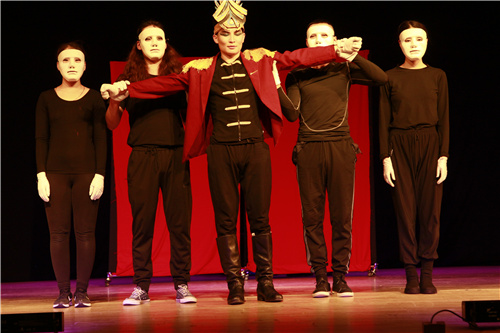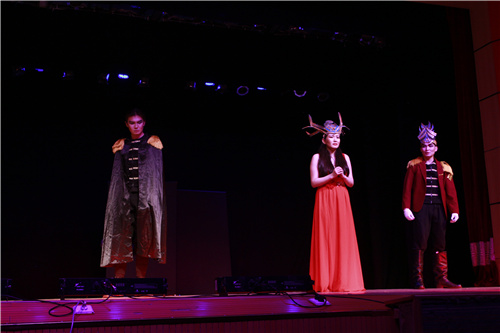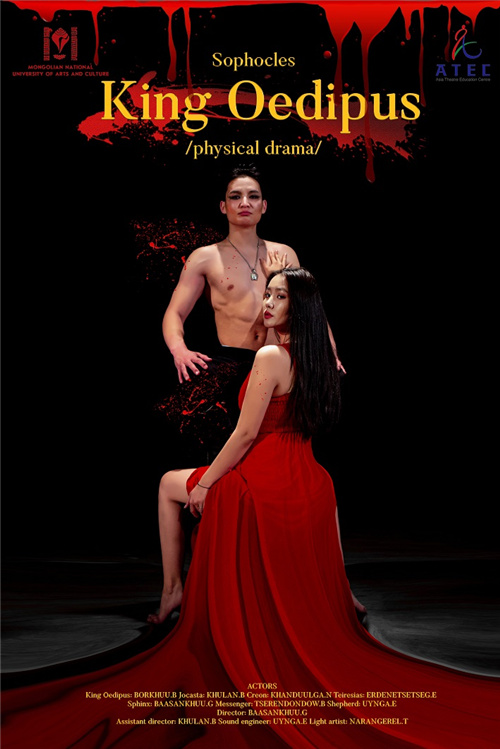
Director: Baasankhuu Gantulga
Playwright: Sophocles
Institution: Mongolian National University of Arts and Culture, Mongolia
Venue: ATEC Website
Time: 09:30, May 18, 2019
Event: The 4th World Theatre Education Conference with 6th Asian Theatre Schools Festival

Director’s Notes
Finding the truth is the hardest thing for an individual. Everyone around you is hiding the truth from you. In the end, you're defeated in the face of the truth, but "You find yourself." This is the most important thing.
How we prepared for the play: Today, the world is struggling with the plague. Mongolia is also facing a difficult time, but we are working hard to get out of this difficult situation. During this difficult time, we did not back down from our goal of learning, but performed in our best possible conditions. Our team read the play “King Oedipus” online, rehearsed it at home, and then one day we got together and performed on stage and recorded the play.
We played the relationship of the characters on stage mostly in an audience-oriented way. Also I would like to mention some features from the play. First, we have tested some techniques of modern physical theatre. Second, in this difficult situation with the pandemic, people have to keep their distance from each other in terms of hygiene. Thirdly, we worked on the main content of the play “King Oedipus” and chose the freedom of the costume and stage, regardless of the date and form of the play. It was an innovative process for the students who worked on our play.
We will go through difficult times together. I wish you success and good health.

Synopsis
Oedipus, King of Thebes, sends his brother-in-law, Creon, to ask advice of the oracle at Delphi, concerning a plague ravaging Thebes. Creon returns to report that the plague is the result of religious pollution, since the murderer of their former king, Laius, has never been caught.
Oedipus summons the blind prophet Tiresias for help. When Tiresias arrives he tells him to abandon his search, and tells the king that Oedipus himself is the murderer he seeks. Oedipus concludes that the prophet must have been paid off by Creon in an attempt to undermine him. Eventually Tiresias leaves, muttering darkly that the murderer is a native citizen of Thebes, brother and father to his own children, and son and husband to his own mother.
Creon arrives to face Oedipus's accusations. Jocasta, wife of first Laius and then Oedipus, enters and attempts to comfort Oedipus, telling him he should take no notice of prophets. As proof, prophecy stated that Laius would be killed by his own son; however, Jocasta reassures Oedipus by her statement that Laius was killed by bandits at a crossroads on the way to Delphi. Oedipus suddenly becomes worried that Tiresias's accusations were true. Oedipus then sends for the one surviving witness of the attack to be brought to the palace from the fields where he now works as a shepherd.
A man arrives from Corinth with the message that Oedipus's father has died. Oedipus is made ecstatic by this news, for it proves one half of the prophecy false, for now he can never kill his father. The messenger tells him not to worry, because Merope was not in fact his real mother.
It emerges that this messenger was given a baby, which the childless Polybus then adopted. The baby, he says, was given to him by another shepherd from the Laius household, who had been told to get rid of the child. He is the "same shepherd" who was witness to the murder of Laius, and whom Oedipus had already sent for.
When the shepherd arrives Oedipus questions him. It emerges that the child he gave away was Laius's own son, and that Jocasta had given the baby to the shepherd to secretly be exposed upon the mountainside. This was done in fear of the prophecy that Jocasta said had never come true: that the child would kill his father.
Everything is at last revealed, and Oedipus curses himself and fate before leaving the stage. The chorus laments how even a great man can be felled by fate, and following this, a servant exits the palace to speak that Jocasta hangs herself. Shortly afterward, Oedipus blinds his eyes in despair.
A blind Oedipus now begs to be exiled as soon as possible. Creon enters, Oedipus asks Creon to watch over his two daughters, Antigone and Ismene, and Creon agrees.
On an empty stage the chorus repeats the common Greek maxim, that no man should be considered fortunate until he is dead.

